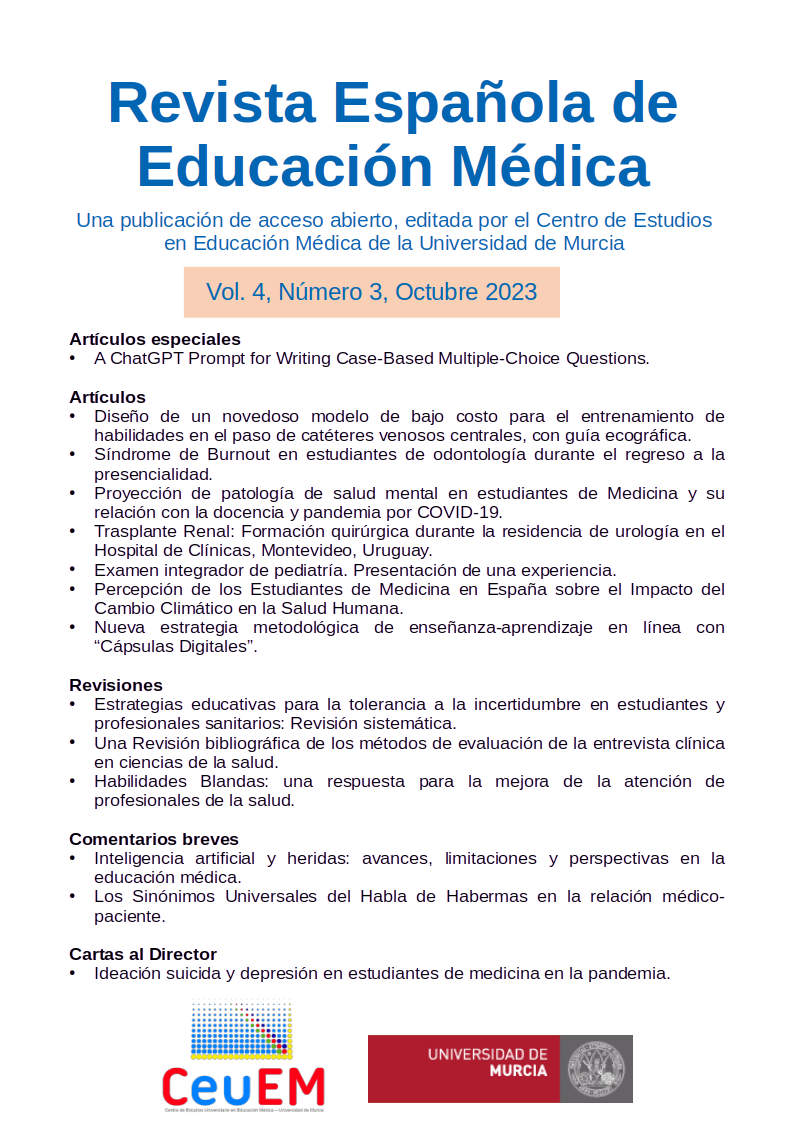A ChatGPT Prompt for Writing Case-Based Multiple-Choice Questions
Resumen
The significant challenge faced by medical schools is the effortful process of writing a high quantity of high-quality case-based multiple-choice questions (MCQs) to assess the higher-order skills of medical students. The demand for a high volume of MCQs in education has led to the development of Automatic Item Generation (AIG), specifically template-based AIG, which involves creating cognitive and item models by subject matter experts to generate hundreds of MCQs at once using software. It demonstrated significant success in various languages and even being incorporated into national medical licensure exams. However, this method still heavily depends on the efforts of subject matter experts. This paper introduces a detailed ChatGPT prompt for quickly generating case-based MCQs and provides important research questions for future exploration into ChatGPT's potential in generating items, signaling the beginning of the artificial intelligence era in medical education, encouraging health professions education researchers to delve deeper into its potential.
Descargas
-
Resumen3929
-
pdf 4145
Citas
Daniel M, Rencic J, Durning SJ, Holmboe E, Santen SA, Lang V, et al. Clinical Reasoning Assessment Methods: A Scoping Review and Practical Guidance. Academic Medicine. 2019;94(6): 902–912. https://doi.org/10.1097/ACM.0000000000002618.
Pugh D, De Champlain A, Touchie C. Plus ça change, plus c’est pareil: Making a continued case for the use of MCQs in medical education. Medical Teacher. 2019;41(5): 569–577. https://doi.org/10.1080/0142159X.2018.1505035.
Schuwirth LWT, van der Vleuten CPM. Different written assessment methods: what can be said about their strengths and weaknesses? Medical Education. 2004;38(9): 974–979. https://doi.org/10.1111/j.1365-2929.2004.01916.x.
Wrigley W, Van Der Vleuten CP, Freeman A, Muijtjens A. A systemic framework for the progress test: Strengths, constraints and issues: AMEE Guide No. 71. Medical Teacher. 2012;34(9): 683–697. https://doi.org/10.3109/0142159X.2012.704437.
Gierl MJ, Lai H, Turner SR. Using automatic item generation to create multiple-choice test items. Medical Education. 2012;46(8): 757–765. https://doi.org/10.1111/j.1365-2923.2012.04289.x.
Gierl MJ, Lai H, Tanygin V. Advanced Methods in Automatic Item Generation.. 1st ed. Routledge; 2021. https://doi.org/10.4324/9781003025634. [Accessed 1st August 2022].
Kıyak YS, Budakoğlu Iİ, Coşkun Ö, Koyun E. The First Automatic Item Generation in Turkish for Assessment of Clinical Reasoning in Medical Education. Tıp Eğitimi Dünyası. 2023;22(66): 72–90. https://doi.org/10.25282/ted.1225814.
Gierl MJ, Lai H, Pugh D, Touchie C, Boulais AP, De Champlain A. Evaluating the Psychometric Characteristics of Generated Multiple-Choice Test Items. Applied Measurement in Education. 2016;29(3): 196–210. https://doi.org/10.1080/08957347.2016.1171768.
Harari YN. Yuval Noah Harari argues that AI has hacked the operating system of human civilisation. The Economist. 2023; https://www.economist.com/by-invitation/2023/04/28/yuval-noah-harari-argues-that-ai-has-hacked-the-operating-system-of-human-civilisation [Accessed 7th October 2023].
Buchholz K. Infographic: ChatGPT Sprints to One Million Users. Statista Infographics. https://www.statista.com/chart/29174/time-to-one-million-users [Accessed 28th April 2023].
Ali K, Barhom N, Tamimi F, Duggal M. ChatGPT—A double‐edged sword for healthcare education? Implications for assessments of dental students. European Journal of Dental Education. 2023; eje.12937. https://doi.org/10.1111/eje.12937.
Carrasco JP, García E, Sánchez DA, Porter E, De La Puente L, Navarro J, et al. ¿Es capaz “ChatGPT” de aprobar el examen MIR de 2022? Implicaciones de la inteligencia artificial en la educación médica en España. Revista Española de Educación Médica. 2023;4(1). https://doi.org/10.6018/edumed.556511.
Choi EPH, Lee JJ, Ho MH, Kwok JYY, Lok KYW. Chatting or cheating? The impacts of ChatGPT and other artificial intelligence language models on nurse education. Nurse Education Today. 2023;125: 105796. https://doi.org/10.1016/j.nedt.2023.105796.
Wang YM, Shen HW, Chen TJ. Performance of ChatGPT on the pharmacist licensing examination in Taiwan. Journal of the Chinese Medical Association. 2023;86(7): 653–658. https://doi.org/10.1097/JCMA.0000000000000942.
Masters K. Ethical use of artificial intelligence in health professions education: AMEE Guide No.158. Medical Teacher. 2023; 1–11. https://doi.org/10.1080/0142159X.2023.2186203.
Brown T, Mann B, Ryder N, Subbiah M, Kaplan JD, Dhariwal P, et al. Language Models are Few-Shot Learners. In: Larochelle H, Ranzato M, Hadsell R, Balcan MF, Lin H (eds.) Advances in Neural Information Processing Systems. Curran Associates, Inc.; 2020. p. 1877–1901. https://proceedings.neurips.cc/paper_files/paper/2020/file/1457c0d6bfcb4967418bfb8ac142f64a-Paper.pdf
Tatla E. 5 Essential AI (ChatGPT) Prompts Every Medical Student and Doctor Should be Using to 10x their…. Medium. 2023. https://medium.com/@eshtatla/5-essential-ai-chatgpt-prompts-every-medical-student-and-doctor-should-be-using-to-10x-their-de3f97d3802a [Accessed 18th September 2023].
Derechos de autor 2023 Servicio de Publicaciones de la Universidad de Murcia

Esta obra está bajo una licencia internacional Creative Commons Atribución-NoComercial-SinDerivadas 4.0.
Las obras que se publican en esta revista están sujetas a los siguientes términos:
1. El Servicio de Publicaciones de la Universidad de Murcia (la editorial) conserva los derechos patrimoniales (copyright) de las obras publicadas y favorece y permite la reutilización de las mismas bajo la licencia de uso indicada en el punto 2.
© Servicio de Publicaciones, Universidad de Murcia
2. Las obras se publican bajo una licencia Creative Commons Reconocimiento-NoComercial-SinObraDerivada 4.0.
![]()
3. Condiciones de auto-archivo. Se permite y se anima a los autores a difundir electrónicamente las versiones preprint (versión antes de ser evaluada y enviada a la revista) y/o post-print (versión evaluada y aceptada para su publicación) de sus obras antes de su publicación, ya que favorece su circulación y difusión más temprana y con ello un posible aumento en su citación y alcance entre la comunidad académica.




















